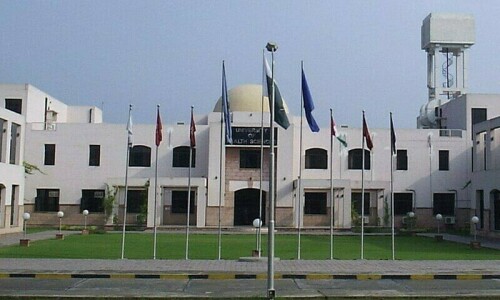LAHORE: The Punjab Higher Education Commission has decided in principle to work under the federal HEC, while the Sindh HEC is still indecisive on the issue.
“Punjab HEC has decided in principle to work under the (federal) HEC. It has no issue working with the HEC any more. The Sindh HEC (representative), however, did not appear in the last three meetings of the committee (formed to determine the role of (federal) HEC and the provincial HECs in the light of 18th Amendment),” Federal Minister for Planning and Reforms Ahsan Iqbal told Dawn.
Mr Iqbal is also the head of the committee Prime Minister Nawaz Sharif had constituted after Sindh had taken up the matter, seeking more autonomy (in degree recognition) and funds, with the Council of Common Interest (CCI).
The three HECs -- federal, Punjab and Sindh -- have not been on the same page on different matters. The committee is authorised to come up with recommendations to decide the role of the central and provincial HECs in the post-18th amendment scenario. And in the light of the committee’s recommendations the CCI will decide the matter.
“We have submitted a preliminary report to the prime minister in this regard. Sindh may have some issues with the HEC as it neither attended (committee’s) last three meetings, nor replied to the committee’s letters,” the minister said.
Mr Iqbal added the federal HEC’s role could not be diminished after the establishment of provincial HECs. “There has to be one centralised body for accreditation of degrees and ensure that Pakistani varsities follow international standards of education,” he said and made it clear that the “funds being given to the (federal) HEC fall in the constitutional funding. In fact, these are the discretionary funds”.
Ahsan Iqbal said the provincial HECs should not think they would get huge funding from the federal government if the HEC’s role was minimised. “The (federal) HEC will stay and continue doing what it was doing before the 18th Amendment,” he said.
After the 18th Amendment, only Punjab and Sindh formed their own HECs, while Balochistan, Khyber Pakhtunkhwa, Gilgit-Baltistan and Azad Kashmir had shown ‘least interest’ in forming such higher education bodies.
The provincial HECs contend that decentralisation is necessary for their efficient working. In the light of the 18th Amendment, it is the responsibility of respective provincial governments to manage and provide financial, technical and logistical resources for improving quality, enhancing access and ensuring relevance of research and development on a par with national and international standards.
Federal HEC, on the other hand, is of the view that unless the HEC Ordinance 2002 is amended or modified by a new federal legislation, the powers and functions of the commission cannot be rescinded or modified through a provincial legislation or an executive order. A decision thereof in national interest and in accordance with the provisions of the Constitution is required.
“The higher education is transnational unlike primary and secondary education. It follows global standards. It determines quality of human resource and fuels economic development by building edifice of a progressive, developed and a just society. The provinces have major, wide and deep-rooted challenge of improving the quality, management and governance of primary, secondary, higher secondary education and affiliated colleges,” an HEC official told Dawn on Saturday.
“Additional responsibility of universities will leave the provincial government in greater complications. Its (HEC’s) fragmentation is expected to adversely impact the development of higher education sector and will create disparities among the provinces and diffuse national harmony. It may also derail the process of national planning and coordination and create serious issues of national and international recognition of degrees and qualifications, equitable access, nationhood through divergent curriculum, citizenship and ethical standards, demotion of research on national priorities and issues. It may also weaken quality assurance and compliance of national higher education standards, impede international treaties and collaboration opportunities,” he said, adding the HEC was providing development and other funds to the provincial universities even after the creation of the provincial bodies in Punjab and Sindh.
Published in Dawn, August 28th, 2016











































